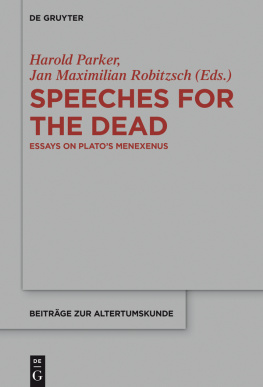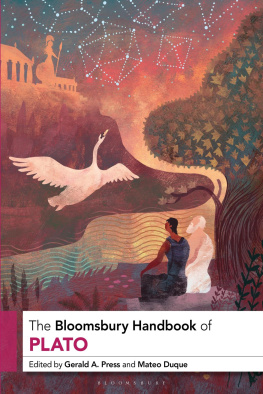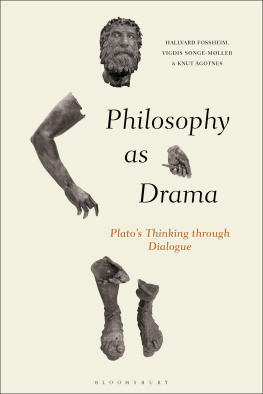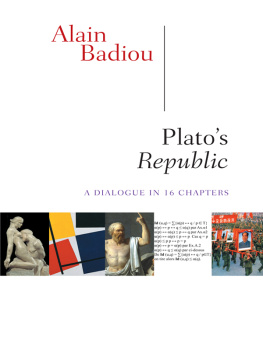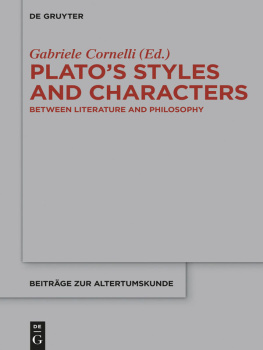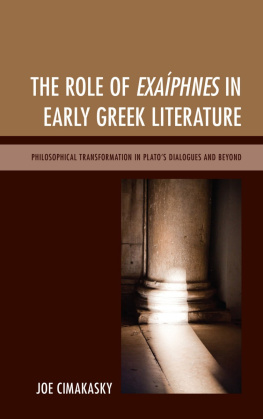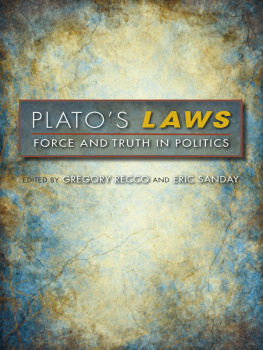Table of Contents
Guide

Speeches for the Dead
Beitrge zur Altertumskunde

Herausgegeben von Susanne Daub, Michael Erler,
Dorothee Gall, Ludwig Koenen und Clemens Zintzen
Band 368
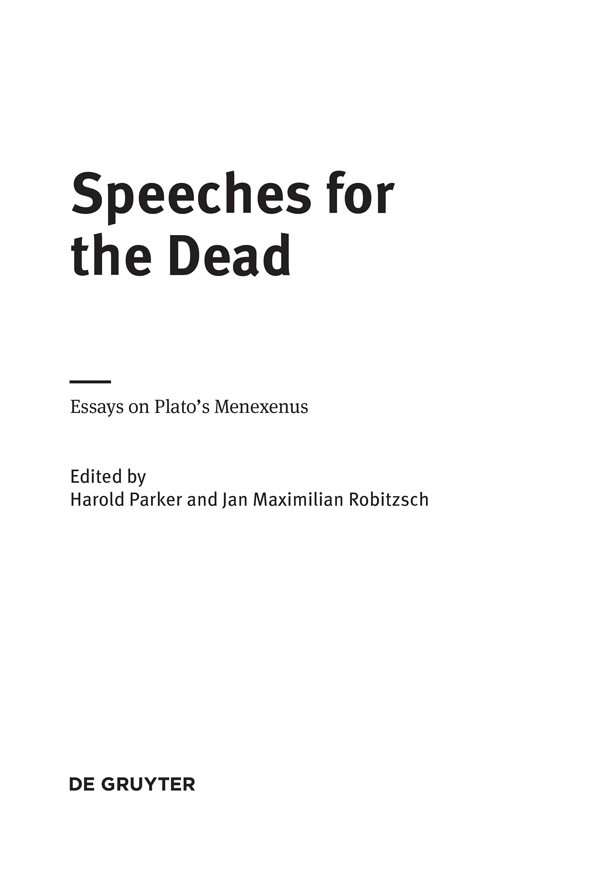
ISBN 978-3-11-057073-1
e-ISBN (PDF) 978-3-11-057589-7
e-ISBN (EPUB) 978-3-11-057397-8
ISSN 1616-0452
Library of Congress Control Number: 2018945372
Bibliographic information published by the Deutsche Nationalbibliothek
The Deutsche Nationalbibliothek lists this publication in the Deutsche Nationalbibliografie;
detailed bibliographic data are available on the Internet at http://dnb.dnb.de.
2018 Walter de Gruyter GmbH, Berlin/Boston
www.degruyter.com
Acknowledgement
Our interest in the Menexenus originated in a 2013 summer reading group at the University of Pennsylvania. Fascinated by the text, we decided to organize a one-day conference dedicated to it in 2014. We would like to thank everyone who helped organize the conference, Andreas Avgousti, Aditi Chaturvedi, and Brian Reece, as well as the University of Pennsylvania Philosophy Department and the Penn Graduate and Professional Student Assembly for their financial support. After organizing the conference, we decided to publish some of the conference papers in a collected volume. We would like to thank Susan Sauv Meyer for her advice and help in navigating the publication process as well as Charles Kahn and Chicago University Press for the permission to republish his 1963 paper. Finally, we reserve our greatest thanks for Andreas Avgousti, who in the beginning phases of the project served as co-editor and whose valuable feedback on all papers greatly improved the quality of the volume overall.
| Philadelphia, October 2017 | Harold Parker |
| Jan Maximilian Robitzsch |
Harold Parker
Jan Maximilian Robitzsch
Introduction
In accordance with its name, one may certainly say that the Menexenus has remained a stranger ( menein + xenos ) to its readers.
Perhaps the most enigmatic feature of the dialogue is its anachronism. The Menexenus consists of a frame dialogue that discusses the genre of funeral oratory (234a236d, 249de) and a funeral oration that Socrates recites (236d249c). One would expect that such an oration commemorates those who have fallen in the Peloponnesian War, given the lifetime of the historical Socrates. However, the oration of the Menexenus recounts recent events up until the Peace of Antalcidas of 387 BCE.
As a result of these anachronisms, as well as certain distortions of historic events recounted in the epitaphios logos and a Gorgianic rather than Platonic tone,
Interestingly, the main point of contention in regard to the Menexenus today lies elsewhere: modern scholars recognized the dialogue as an authentic work of Plato at the price of declaring its content wholly ironic. Some of the ideas presented in the text may very well have seemed too strange. In this vein, the dialogue was often considered to be a parody or more simply one big joke. This amounts to saying that the text is devoid of philosophical significance. A striking feature of the serious versus ironic debate in regard to the Menexenus is that these concepts are often under-theorized. Regardless, though, such a dismissal of the text does not seem to do justice to the Menexenus as a whole. Why would a philosophically versed author like Plato write a dialogue that is a big joke? Accordingly, other scholars have rightly pushed back against such a reading and suggested that the dialogue is wholly serious. Likewise, however, such a reading may well miss the target in another way and not quite do justice to the parodic character of the dialogue. Be this as it may, it seems fair to say that at the beginning of the 21st century, the debate on what general reading of the Menexenus one should adopt is still wide open: a satisfactory and generally, or at least widely, accepted account of how to understand the dialogue does not seem to be in sight and is very much a desideratum of future scholarship.
Regardless of this scholarly disagreement and in the absence of a passe-partout for the text as a whole, recent discussions of the Menexenus advance the conversation by focusing on the philosophical content of the text and so the ideas contained in the dialogue. As a result, our understanding of the funeral oration has progressed both in itself, and in regard to other Platonic dialogues and epitaphioi logoi such as those attributed to Lysias and Pericles. The present volume stands in this tradition. It seeks to advance the discussion on the text (1) by documenting the state of the debate at the beginning of the 21st century, (2) by taking up some classical points of contention, and (3) by turning to problems that have so far received only limited scholarly attention. The volume reunites nine contributions, seven of which were first presented at the Penn Ancient Workshop at the University of Pennsylvania in January 2014. One additional contribution was commissioned, and Charles Kahns seminal 1963 article on the dialogue is reprinted. The contributions vary in scope and in their approach to the text: they show en miniature the wealth of approaches to Plato and disagreements regarding what a correct reading should resemble. We hope that they will be an ideal starting point for anyone interested in studying the dialogue more closely, especially in view of the extensive bibliography on the Menexenus we have appended.
The papers in the volume can be sorted into five thematic clusters although they often have considerably more thematic overlap than the following classification suggests: (1) intertextual approaches to the Menexenus , (2) analyses of structure of the dialogue, (3) rhetoric, (4) parallels between the Laws and Menexenus , and (5) social and political topics.
1Intertextual Approaches
Charles Kahns seminal 1963 paper Platos Funeral Oration: The Motive of the Menexenus remains widely cited and represents the long dominant historical intertextual approach to the Menexenus. Kahn sets the stage for any understanding of the dialogue by outlining five puzzles that any interpretation of the dialogue must address, puzzles that subsequent papers of the volume also take up. In particular, he asks (1) why the funeral oration is attributed to Aspasia, (2) why there are such glaring anachronisms in the speech, (3) why history is distorted in the funeral oration the way it is, (4) why Plato wrote a funeral oration in the first place, and (5) why in subsequent years, the speech was regularly read. In his paper, Kahn answers these questions by examining the historical context of the dialogues creation, in particular the intertextual relations of the Menexenus with Pericless oration in Thucydides, Isocrates Panegyricus , and the funeral oration ascribed to Lysias. Kahn then concludes that the Menexenus is to be understood as Platos pamphlet on current Athenian politics.
In Reading the Menexenus Intertextually, Marc Zelcer explicitly takes up Kahns first question, that is, why Plato made Aspasia the author of Socrates speech. Zelcer agrees with Kahn that the figure of Aspasia establishes a link between Pericles and Thucydides, but claims that a special explanation is needed to make sense of the fact that Plato claims that Aspasia is both the author of Pericles and Socrates oration. According to Zelcer, this special explanation consists in a specific kind of intertextuality that the dialogue exhibits. Drawing on the work of Mikhail Bakhtin, Zelcer argues that the two speeches should be read as part of a single, extended dialogue across time and space with two primary interlocutors: Pericles and Socrates.

